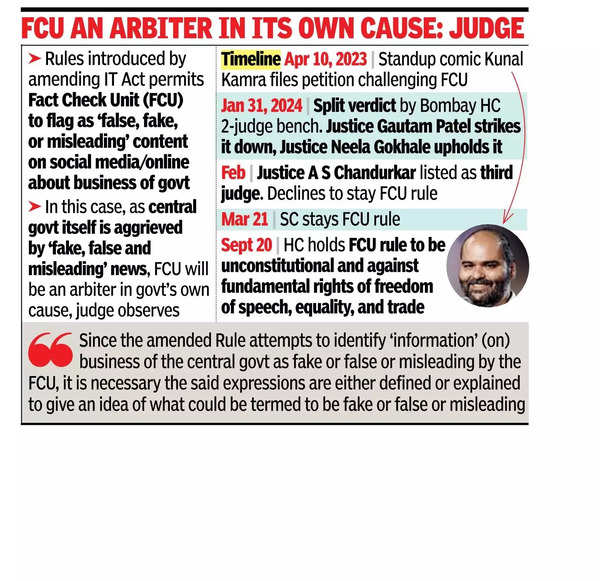MUMBAI: Describing it as an infringement on the correct to equality and freedom of speech, Bombay excessive court docket on Friday quashed the amended Data Expertise guidelines enabling the Centre to arrange its personal truth examine unit (FCU) and flag social media content material about its functioning as ‘faux, false or deceptive’.
Holding the FCU to be unconstitutional, Justice A S Chandurkar of the Bombay excessive court docket – who served as ‘tie-breaker decide’ after a division bench in Jan 2024 delivered a break up verdict – described the expression, ‘faux, false and deceptive’ as ‘imprecise and overbroad’.
Additionally learn: ‘Unconstitutional’: Bombay high court strikes down IT rules amendment which allowed Centre to set up fact check unit
“The FCU in a way is an arbiter in its personal trigger,” mentioned Justice Chandurkar, echoing the view of Justice Patel who had on Jan 31, 2024, struck down the rule as unconstitutional for its vagueness and disproportionality. Justice Patel had differed with Justice Neela Gokhale, on the two-judge bench that heard the matter and arrived at a break up verdict, thus bringing it earlier than a 3rd decide.
Justice Chandurkar mentioned the FCU rule would have “a chilling impact” on people in addition to intermediaries; the brand new rule may have led to lack of ‘secure harbour’ in opposition to authorized motion for social media platforms if FCU-flagged content material was not acted upon. The FCU rule is sans safeguards to forestall its abuse, mentioned Justice Chandurkar, rejecting the Centre’s stand that making the FCU’s findings topic to a authorized problem was a safeguard.

Curbs imposed by FCU rule fail proportionality take a look at: Choose
Putting down the Centre’s proposed truth examine unit, Justice A S Chandurkar of Bombay excessive court docket mentioned there was no rationale to undertake an train in figuring out whether or not data associated to the enterprise of Central govt was faux or false or deceptive when in digital type however not doing the identical when such data was in print.
“Underneath the correct to freedom of speech and expression, there isn’t any additional ‘proper to the reality’, neither is it the accountability of the State to make sure that residents are entitled solely to ‘data’ that’s not faux or false or deceptive as recognized by FCU,” HC mentioned.
Justice Chandurkar in a 99-page opinion accepted all main contentions raised by comic Kunal Kamra and others who challenged its constitutional validity, citing its “chilling impact” on elementary rights. The decide mentioned he agreed with arguments that the rule violated Article 14 (proper to equality), Article 19 (1) (a) (freedom of speech), and Article 19(1)(g) (freedom of commerce) of the Structure.
The third decide’s ruling renders a majority view in opposition to FCU by 2:1. The judgment to strike down the rule will likely be formally pronounced quickly by a two-judge bench assigned the roster, one of many judges being Justice Gokhale.
Additionally learn: SC takes cognisance of ‘objectionable’ remarks of HC judge against woman lawyer
FCU was introduced into play in April 2023 by way of an modification to guidelines for intermediaries underneath IT Act of 2000. The Centre launched it as a mechanism to flag as ‘faux, false or deceptive’ digital content material regarding the ‘enterprise’ or functioning of the Centre. Kamra, adopted by others together with Editors Guild of India, Information Broadcasters & Digital Affiliation and Affiliation of India Magazines challenged the choice, citing its vagueness and overbreadth and the shortage of the Centre’s authorized capability to separate content material on-line to fall in two classes – non-govt-related and govt-related.
The rule can’t be saved by studying it down, Justice Chandurkar concluded, rejecting the Centre’s rivalry of getting “adopted the least restrictive mode to forestall the unfold” of data that it deemed faux, false or deceptive.
When he first started listening to the matter in March 2024, Justice Chandurkar had declined Kamra’s plea for an interim keep, pending closing disposal of the problem. The Union govt, subsequently, notified FCU. Kamra went to SC which on March 20 stayed the rule, noting constitutional points had been raised.
Justice Chandurkar mentioned the restrictions imposed by the rule failed the proportionality take a look at “particularly when it seeks to abridge elementary rights, (to free speech and commerce).” He held, “Rule 3(1)(b)(v) seeks to limit the basic proper… by in search of to put restrictions” that don’t align with Article 19(2) (affordable restrictions). It’s “impermissible by way of the mode of delegated laws,” held Justice Chandurkar.
“The Editors Guild of India is justified in its grievance that it’s involved with each, the print media in addition to digital platforms. There’s thus an infringement of the correct assured underneath Article 19(1)(g) (freedom of commerce),” mentioned the third Choose.



